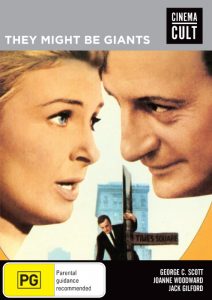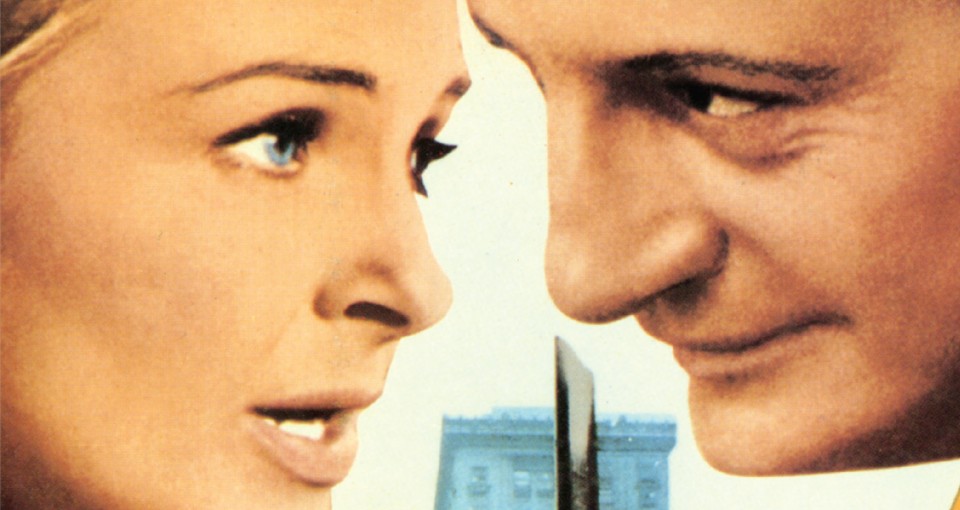Shock/Cinema Cult, Rated PG
A big flop on first release back in 1971 and hard-to-see since, this dated-looking but often enjoyable comedy is notable for pairing the picky Joanne Woodward and George C. Scott (shortly after being awarded – and declining – the Oscar for Patton) and for that title, originally inspired by Don Quixote and later adopted by that infamously quizzical rock outfit (although they do like to deny it). Drawn from a play by screenwriter James Goldman (who later admitted that he never really got either right), it’s a familiar story with a lot of charm if you can handle the aren’t-we-all-a-little-mad? sentiments about mental illness that would be seriously frowned upon today, and also form the basis of now-embarrassing of-the-time cult items like Morgan: A Suitable Case For Treatment and King Of Hearts.
quizzical rock outfit (although they do like to deny it). Drawn from a play by screenwriter James Goldman (who later admitted that he never really got either right), it’s a familiar story with a lot of charm if you can handle the aren’t-we-all-a-little-mad? sentiments about mental illness that would be seriously frowned upon today, and also form the basis of now-embarrassing of-the-time cult items like Morgan: A Suitable Case For Treatment and King Of Hearts.
An awkward set-up introduces judge Justin Playfair (Scott), who flips out after the death of his wife and imagines himself to be Sherlock Holmes, complete with deerstalker, pipe, violin, arrogant manner and fondness for fancy deductive reasoning, which he first uses in an opening scene upon an unfortunate unnamed messenger briefly played by Al Lewis (Grandpa from TV’s The Munsters). His delusional pursuit of Professor Moriarty takes a dangerous turn and his greedy brother (Lester Rawlins) wants him committed, and he eventually piques the interest of psychiatrist Dr. Mildred Watson (Woodward), who becomes intrigued with the case and starts following him around in his quest to stop his intangible nemesis.
It’s all a bit laboured and sometimes silly but Joanne (who tended to stay out of movies and let her husband Paul Newman do all the work) and George (not renowned for his sense of humour and often a handful onset) are in top form and very pleasing to watch, right down to the curiously uncertain and certainly darkly ‘70s ending. And, well, elementary.
3 stars
Dave Bradley
Shock/Cinema Cult, Rated PG A big flop on first release back in 1971 and hard-to-see since, this dated-looking but often enjoyable comedy is notable for pairing the picky Joanne Woodward and George C. Scott (shortly after being awarded – and declining – the Oscar for Patton) and for that title, originally inspired by Don Quixote and later adopted by that infamously quizzical rock outfit (although they do like to deny it). Drawn from a play by screenwriter James Goldman (who later admitted that he never really got either right), it’s a familiar story with a lot of charm if you can handle the aren’t-we-all-a-little-mad? sentiments about mental illness that would be seriously frowned upon today, and also form the basis of now-embarrassing of-the-time cult items like Morgan: A Suitable Case For Treatment and King Of Hearts. An awkward set-up introduces judge Justin Playfair (Scott), who flips out after the death of his wife and imagines himself to be Sherlock Holmes, complete with deerstalker, pipe, violin, arrogant manner and fondness for fancy deductive reasoning, which he first uses in an opening scene upon an unfortunate unnamed messenger briefly played by Al Lewis (Grandpa from TV’s The Munsters). His delusional pursuit of Professor Moriarty takes a dangerous turn and his greedy brother (Lester Rawlins) wants him committed, and he eventually piques the interest of psychiatrist Dr. Mildred Watson (Woodward), who becomes intrigued with the case and starts following him around in his quest to stop his intangible nemesis. It’s all a bit laboured and sometimes silly but Joanne (who tended to stay out of movies and let her husband Paul Newman do all the work) and George (not renowned for his sense of humour and often a handful onset) are in top form and very pleasing to watch, right down to the curiously uncertain and certainly darkly ‘70s ending. And, well, elementary. 3 stars Dave Bradley
THEY MIGHT BE GIANTS: The Game’s Afoot ~ DVD Revi
THEY MIGHT BE GIANTS: The Game’s Afoot ~ DVD Revi
2019-09-03
Dave Bradley
Dave Bradley
60
Very pleasing to watch...
User Rating: Be the first one !
60
 quizzical rock outfit (although they do like to deny it). Drawn from a play by screenwriter James Goldman (who later admitted that he never really got either right), it’s a familiar story with a lot of charm if you can handle the aren’t-we-all-a-little-mad? sentiments about mental illness that would be seriously frowned upon today, and also form the basis of now-embarrassing of-the-time cult items like Morgan: A Suitable Case For Treatment and King Of Hearts.
quizzical rock outfit (although they do like to deny it). Drawn from a play by screenwriter James Goldman (who later admitted that he never really got either right), it’s a familiar story with a lot of charm if you can handle the aren’t-we-all-a-little-mad? sentiments about mental illness that would be seriously frowned upon today, and also form the basis of now-embarrassing of-the-time cult items like Morgan: A Suitable Case For Treatment and King Of Hearts.



